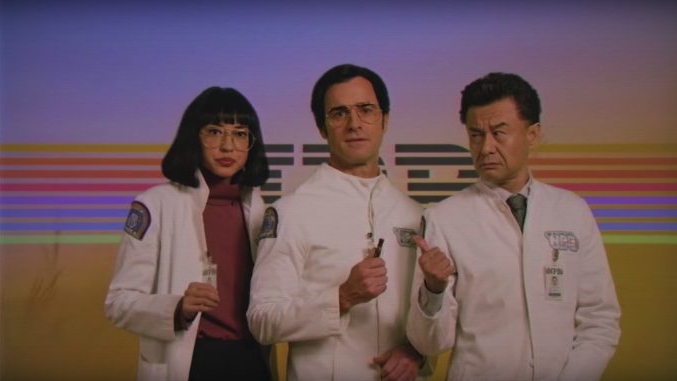Review: Maniac
Brief moments of connection in a vast sea of emptiness: that’s the phrase that keep popping into my head as I watched Cary Fukunaga’s genre-bending, uncategorizable series Maniac this weekend. It begins with Owen Milgrim (Jonah Hill) - son of a wealthy New York family - desperately attempting to escape the clutches of his brother’s misdeed. His paranoid schizophrenia makes this escape a bit more complicated than one would assume. It then shifts to Annie Landsberg (Emma Stone), a woman whose guilt over saying the wrong thing to her sister at the wrong time has colored her connections, and more importantly disconnections, since. Both enter the late stages of Neberdine Pharmaceuticals’ most recent medical breakthrough: a pill that, they are assured, will solve all their problems permanently. A pill to replace therapy. And it’s here where Fukanaga dives deep into the unvoiced wishes and past traumas of the central duo.
At the heart of their journeys through the alphabetical process - an A pill to draw the traumas to the surface, a process the project head calls ‘agonia’, a B pill to identify self-defense mechanisms preventing the individual from confronting the repressed traumas, and a C pill to help the individual confront the unearthed trauma - is a repeated theme: the scarcity of connection. Both Annie and Owen confront facsimiles of real traumas in their lives - whether its as a seventies gangster drama that reveals the subjective terror of feeling like an enemy in your own home or as a Tolkein-esque tale of magic springs and cursed ailments - through the trial. Outside machinations keep the proceedings fresh and give the tale a sense of urgency, but it’s when Fukunaga slows down and lets the actors bask in real connection, intimate, honest conversation, that the show truly soars. Both Hill and Stone are up to the task and, when Fukanaga lets them shine, they shine so brightly that the show seems impossibly heartfelt. However, the show’s breakneck pace, thrusting us from one genre to the next, often works to the detriment of this dramatic brilliance.
It’s an inspired idea (and a daring one) to tackle such vastly different genres with a relatively consistent tone - darkly comedic with moments of unguarded honesty peppered throughout. And, individually, many of these vignettes are utterly compelling (an 80s caper mystery stands out as the series highlight). Yet, others, feel underbaked - the aforementioned Tolkein-esque vignette is recurring and, mostly, serves as unsubtle exposition dump - despite Stone’s admirable work. And these underbaked segments are made all the more problematic by jarring transitions between tones; it’s hard not to experience whiplash when you go from 0 to 100 in the blink of an eye or, more appropriately, from Tolkein to Bond in the blink of an eye. The interspersal of the real-world drama in the lab, some of which works - Sonoya Mizuno’s Dr. Fujita - some of which doesn’t - Justin Theroux’s mannered speech and predictable emotional arc as Dr. Manterlay, does help alleviate some of this whiplash, but it doesn’t ever do enough to ease the sections into each other. And, a good deal of tonal smoothing would have gone a long way toward making this show feel more consistent.
But, it’s hard to complain too much when the overall results of Maniac are so visually ravishing and still so sporadically awe-inspiring. When Fukunaga’s 70s-future transcends its influences (take a pinch of Alien, a dash of Bioshock: Infinite, a squeeze of Charlie Kaufman, and a dab of Her), it finds something close to magic. It manages to trim through the noise of multiple storylines in wildly differing genres with utterly polar opposite tones and reach in and grasp ahold of a nugget of connection and emotion honest to the characters’ situation and development. These moments may be brief and they may be sparse, but when they happen, it’s hard not to stop and stare in awe. And, perhaps that’s poetic given its overarching theme.












